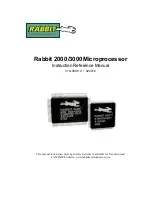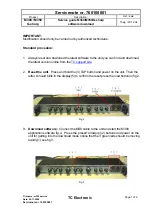
monitored to identify changes in values and determine whether the values are within threshold limits.
Many mechanical and electrical failures display some degradation in performance before failure.
A SMART failure is also referred to as predicted failure. There are numerous factors that are predicted
physical disk failures, such as a bearing failure, a broken read/write head, and changes in spin-up rate. In
addition, there are factors related to read/write surface failure, such as seek error rate and excessive bad
sectors.
NOTE: For detailed information on SCSI interface specifications, see
t10.org
and for detailed
information on SATA interface specifications, see
t13.org
.
Automatic Replace Member With Predicted Failure
A
Replace Member
operation can occur when there is a SMART predictive failure reporting on a physical
disk in a virtual disk. The automatic
Replace Member
is initiated when the first SMART error occurs on a
physical disk that is part of a virtual disk. The target disk needs to be a hot spare that qualifies as a rebuild
disk. The physical disk with the SMART error is marked as
failed
only after the successful completion of
the
Replace Member
. This prevents the array from reaching degraded state.
If an automatic
Replace Member
occurs using a source disk that was originally a hot spare (that was used
in a rebuild), and a new disk added for the
Replace Member
operation as the target disk, the hot spare
reverts to the hot spare state after a successful
Replace Member
operation.
NOTE: To enable the automatic
Replace Member
, use the Dell OpenManage storage management
application. For information on manual
Replace Member
, see
Replacing An Online Physical Disks
.
Patrol Read
The
Patrol Read
feature is designed as a preventative measure to ensure physical disk health and data
integrity.
Patrol Read
scans and resolves potential problems on configured physical disks. The Dell
OpenManage storage management application can be used to start
Patrol Read
and change its behavior.
The following is an overview of
Patrol Read
behavior:
•
Patrol Read
runs on all disks on the controller that are configured as part of a virtual disk, including
hot spares.
•
Patrol Read
does not run on physical disks that are not part of a virtual disk or are in
Ready
state.
•
Patrol Read
adjusts the amount of controller resources dedicated to
Patrol Read
operations based on
outstanding disk I/O. For example, if the system is busy processing I/O operation, then
Patrol Read
uses fewer resources to allow the I/O to take a higher priority.
•
Patrol Read
does not run on any disks involved in any of the following operations:
– Rebuild
– Replace Member
– Full or Background Initialization
– CC
– RLM or OCE
NOTE: By default,
Patrol Read
automatically runs every seven days on configured SAS and SATA
hard drives.
Patrol Read
is not necessary on SSD and is disabled by default.
For more information on
Patrol Read
, see the Dell OpenManage documentation at
dell.com/support/
manuals
.
24
Summary of Contents for PowerEdge H730P
Page 9: ...Contacting Dell 101 Documentation Feedback 101 Locating Your System Service Tag 101 ...
Page 10: ...10 ...
Page 14: ...14 ...
Page 32: ...11 backplane jumper cable connector on the backplane 32 ...
Page 38: ...38 ...
Page 70: ...70 ...
Page 84: ...Figure 5 Disk Carrier LED Indicators 1 activity LED 2 status LED 84 ...
Page 100: ...100 ...
















































